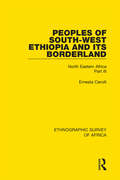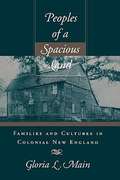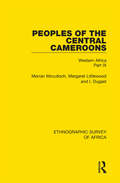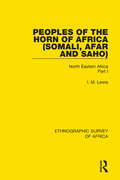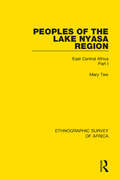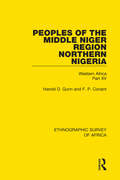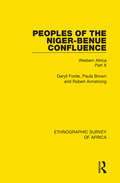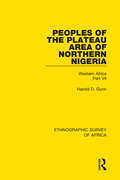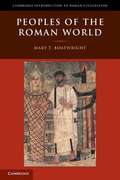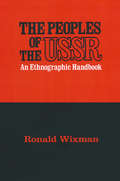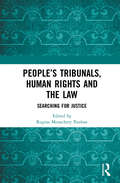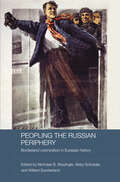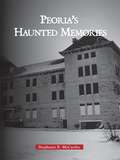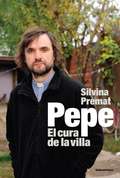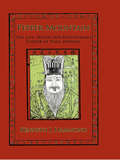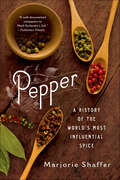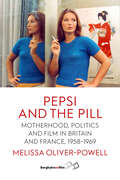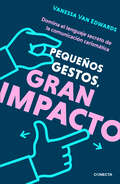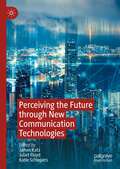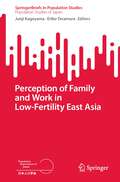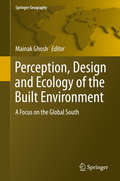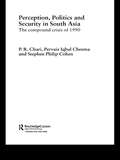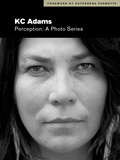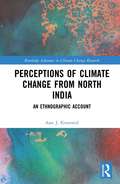- Table View
- List View
Peoples of South-West Ethiopia and Its Borderland: North Eastern Africa Part III
by Ernesta CerulliRoutledge is proud to be re-issuing this landmark series in association with the International African Institute. The series, published between 1950 and 1977, brings together a wealth of previously un-co-ordinated material on the ethnic groupings and social conditions of African peoples. Concise, critical and (for its time) accurate, the Ethnographic Survey contains sections as follows: Physical Environment Linguistic Data Demography History & Traditions of Origin Nomenclature Grouping Cultural Features: Religion, Witchcraft, Birth, Initiation, Burial Social & Political Organization: Kinship, Marriage, Inheritance, Slavery, Land Tenure, Warfare & Justice Economy & Trade Domestic Architecture Each of the 50 volumes will be available to buy individually, and these are organized into regional sub-groups: East Central Africa, North-Eastern Africa, Southern Africa, West Central Africa, Western Africa, and Central Africa Belgian Congo. The volumes are supplemented with maps, available to view on routledge.com or available as a pdf from the publishers.
Peoples of a Spacious Land: Families and Cultures in Colonial New England
by Gloria L. MainIn this book about families--those of the various native peoples of southern New England and those of the English settlers and their descendants--Gloria Main compares the ways in which the two cultures went about solving common human problems. Using original sources--diaries, inventories, wills, court records--as well as the findings of demographers, ethnologists, and cultural anthropologists, she compares the family life of the English colonists with the lives of comparable groups remaining in England and of native Americans. She looks at social organization, patterns of work, gender relations, sexual practices, childbearing and childrearing, demographic changes, and ways of dealing with sickness and death. Main finds that the transplanted English family system produced descendants who were unusually healthy for the times and spectacularly fecund. Large families and steady population growth led to the creation of new towns and the enlargement of old ones with inevitably adverse consequences for the native Americans in the area. Main follows the two cultures into the eighteenth century and makes clear how the promise of perpetual accessions of new land eventually extended Puritan family culture across much of the North American continent.
Peoples of the Central Cameroons (Tikar. Bamum and Bamileke. Banen, Bafia and Balom): Western Africa Part IX
by Merran Mcculloch Margaret Littlewood I. DugastRoutledge is proud to be re-issuing this landmark series in association with the International African Institute. The series, published between 1950 and 1977, brings together a wealth of previously un-co-ordinated material on the ethnic groupings and social conditions of African peoples. Concise, critical and (for its time) accurate, the Ethnographic Survey contains sections as follows: Physical Environment Linguistic Data Demography History & Traditions of Origin Nomenclature Grouping Cultural Features: Religion, Witchcraft, Birth, Initiation, Burial Social & Political Organization: Kinship, Marriage, Inheritance, Slavery, Land Tenure, Warfare & Justice Economy & Trade Domestic Architecture Each of the 50 volumes will be available to buy individually, and these are organized into regional sub-groups: East Central Africa, North-Eastern Africa, Southern Africa, West Central Africa, Western Africa, and Central Africa Belgian Congo. The volumes are supplemented with maps, available to view on routledge.com or available as a pdf from the publishers.
Peoples of the Horn of Africa (Somali, Afar and Saho): North Eastern Africa Part I
by I. M. LewisRoutledge is proud to be re-issuing this landmark series in association with the International African Institute. The series, published between 1950 and 1977, brings together a wealth of previously un-co-ordinated material on the ethnic groupings and social conditions of African peoples. Concise, critical and (for its time) accurate, the Ethnographic Survey contains sections as follows: Physical Environment Linguistic Data Demography History & Traditions of Origin Nomenclature Grouping Cultural Features: Religion, Witchcraft, Birth, Initiation, Burial Social & Political Organization: Kinship, Marriage, Inheritance, Slavery, Land Tenure, Warfare & Justice Economy & Trade Domestic Architecture Each of the 50 volumes will be available to buy individually, and these are organized into regional sub-groups: East Central Africa, North-Eastern Africa, Southern Africa, West Central Africa, Western Africa, and Central Africa Belgian Congo. The volumes are supplemented with maps, available to view on routledge.com or available as a pdf from the publishers.
Peoples of the Lake Nyasa Region: East Central Africa Part I
by Mary TewThis volume, originally published in 1950, discusses the tribes around Lake Nyasa. The rationale for treating the tribes here as members of a single ethnographic province is that the region whose literature has been surveyed is vast, and the ethnic distinctions between its inhabitants have been confused by raids and migrations over centuries.
Peoples of the Middle Niger Region Northern Nigeria: Western Africa Part XV (Ethnographic Survey Of Africa Ser.)
by Harold Gunn F. P. ConantRoutledge is proud to be re-issuing this landmark series in association with the International African Institute. The series, published between 1950 and 1977, brings together a wealth of previously un-co-ordinated material on the ethnic groupings and social conditions of African peoples. Concise, critical and (for its time) accurate, the Ethnographic Survey contains sections as follows: Physical Environment Linguistic Data Demography History & Traditions of Origin Nomenclature Grouping Cultural Features: Religion, Witchcraft, Birth, Initiation, Burial Social & Political Organization: Kinship, Marriage, Inheritance, Slavery, Land Tenure, Warfare & Justice Economy & Trade Domestic Architecture Each of the 50 volumes will be available to buy individually, and these are organized into regional sub-groups: East Central Africa, North-Eastern Africa, Southern Africa, West Central Africa, Western Africa, and Central Africa Belgian Congo. The volumes are supplemented with maps, available to view on routledge.com or available as a pdf from the publishers.
Peoples of the Niger-Benue Confluence (The Nupe. The Igbira. The Igala. The Idioma-speaking Peoples): Western Africa Part X
by Robert Armstrong Paula Brown Daryll FordeRoutledge is proud to be re-issuing this landmark series in association with the International African Institute. The series, published between 1950 and 1977, brings together a wealth of previously un-co-ordinated material on the ethnic groupings and social conditions of African peoples. Concise, critical and (for its time) accurate, the Ethnographic Survey contains sections as follows: Physical Environment Linguistic Data Demography History & Traditions of Origin Nomenclature Grouping Cultural Features: Religion, Witchcraft, Birth, Initiation, Burial Social & Political Organization: Kinship, Marriage, Inheritance, Slavery, Land Tenure, Warfare & Justice Economy & Trade Domestic Architecture Each of the 50 volumes will be available to buy individually, and these are organized into regional sub-groups: East Central Africa, North-Eastern Africa, Southern Africa, West Central Africa, Western Africa, and Central Africa Belgian Congo. The volumes are supplemented with maps, available to view on routledge.com or available as a pdf from the publishers.
Peoples of the Plateau Area of Northern Nigeria: Western Africa Part VII
by Harold D. GunnRoutledge is proud to be re-issuing this landmark series in association with the International African Institute. The series, published between 1950 and 1977, brings together a wealth of previously un-co-ordinated material on the ethnic groupings and social conditions of African peoples. Concise, critical and (for its time) accurate, the Ethnographic Survey contains sections as follows: Physical Environment Linguistic Data Demography History & Traditions of Origin Nomenclature Grouping Cultural Features: Religion, Witchcraft, Birth, Initiation, Burial Social & Political Organization: Kinship, Marriage, Inheritance, Slavery, Land Tenure, Warfare & Justice Economy & Trade Domestic Architecture Each of the 50 volumes will be available to buy individually, and these are organized into regional sub-groups: East Central Africa, North-Eastern Africa, Southern Africa, West Central Africa, Western Africa, and Central Africa Belgian Congo. The volumes are supplemented with maps, available to view on routledge.com or available as a pdf from the publishers.
Peoples of the Roman World (Cambridge introduction to Roman Civilization)
by Mary T. BoatwrightIn this highly-illustrated book, Mary T. Boatwright examines five of the peoples incorporated into the Roman world from the Republican through the Imperial periods: northerners, Greeks, Egyptians, Jews and Christians. She explores the tension between assimilation and distinctiveness in the Roman world over time, as well as the changes effected in Rome by its multicultural nature. Underlining the fundamental importance of diversity in Rome's self-identity, the book explores Roman tolerance of difference and community as the Romans expanded and consolidated their power and incorporated other peoples into their empire. Peoples of the Roman World provides an accessible account of Rome's social, cultural, religious and political history, exploring the rich literary, documentary and visual evidence for these peoples and Rome's reactions to them.
Peoples of the USSR: An Ethnographic Handbook
by Ronald WixmanFirst Published in 2017. This book is a short reference on the peoples of Russia and the USSR. It includes approximately 3,000 entries, cross-references and spelling variations, fifteen original maps and information on dialects, literary languages and religions. It is intended for anyone who needs basic information about the ethnographic groups of the Russian Empire and the USSR in the nineteenth and twentieth centuries.
People’s Tribunals, Human Rights and the Law: Searching for Justice
by Regina PaulosePeople’s Tribunals are independent, peaceful, grassroots movements, created by members of civil society, to address impunity that is associated with ongoing or past atrocities. As such, they offer society an alternative history and create a space for healing and reconciliation to take place that may otherwise be stifled by political agendas and legal technicalities. Since the 1960’s, People’s Tribunals have grown and developed to address many kinds of situations, from genocide to environmental degradation. This book presents a balance of academic and practitioner perspectives on People’s Tribunals. It explores key questions relating to their formation and roles and discusses what they can offer to victims and survivors. The volume provides an introduction to the subject, theoretically informed discussion reflecting different perspectives, and a range of contributions focusing on different types of People’s Tribunals and various aspects of their operation. The authors analyse advantages and disadvantages of these movements in a variety of contexts. The impact and contribution they have in the international criminal law and international human rights context is also discussed. The book will be welcomed by those interested in international criminal law, human rights, environmental justice, transitional justice and international relations.
Peopling the Russian Periphery: Borderland Colonization in Eurasian History (BASEES/Routledge Series on Russian and East European Studies)
by Willard Sunderland Nicholas Breyfogle Abby SchraderThough usually forgotten in general surveys of European colonization, the Russians were among the greatest colonizers of the Old World, eventually settling across most of the immense expanse of Northern Europe and Asia, from the Baltic and the Pacific, and from the Arctic Ocean to Central Asia. This book makes a unique contribution to our understanding of the Eurasian past by examining the policies, practices, cultural representations, and daily-life experiences of Slavic settlement in non-Russian regions of Eurasia from the time of Ivan the Terrible to the nuclear era. The movement of tens of millions of Slavic settlers was a central component of Russian empire-building, and of the everyday life of numerous social and ethnic groups and remains a crucial regional security issue today, yet it remains relatively understudied. Peopling the Russian Periphery redresses this omission through a detailed exploration of the varied meanings and dynamics of Slavic settlement from the sixteenth century to the 1960s. Providing an account of the different approaches of settlement and expansion that were adopted in different periods of history, it includes detailed case studies of particular episodes of migration. Written by upcoming and established experts in Russian history, with exceptional geographical and chronological breadth, this book provides a thorough examination of the history of Slavic settlement and migration from the Muscovite to the Soviet era. It will be of great interest to students and scholars of Russian history, comparative history of colonization, migration, interethnic contact, environmental history and European Imperialism.
Peoria's Haunted Memories
by Stephanie E. MccarthyAt the heart of Peoria's Haunted Memories is the rich and compelling history and folklore of the Peoria area. Buildings and cemeteries in and around the city provide ideal stomping grounds for many restless specters. In this collection of haunted sites, the reader will be introduced to some of Peoria's best-loved mansions, institutions, and graveyards, as well as many of its more illustrious citizens. From Bartonville State Hospital to Bradley University, historic downtown theaters, hotels and taverns, and local churches, where ghostly congregants and ministers continue to worship, this book presents these ghost stories and legends for the fi rst time together in print. In addition to providing thrilling tales, Peoria's Haunted Memories serves as a unique guide for the intrepid supernatural sleuth seeking confi rmation that the dead do not always rest in peace.
Pepe: El cura de la villa
by Silvina PrematBiografía del Padre Pepe, el cura villero con mejor imagen del país. "Es un hombre de Dios que me hace mucho bien al alma y a mi vidaespiritual", dijo Jorge Mario Bergoglio sobre José María Di Paola, másconocido como padre Pepe. El papa Francisco fue, como arzobispo deBuenos Aires, el gran soporte de la obra que desplegó el cura hasta el 8de diciembre de 2010.Ese día, entre lágrimas y abrazos durante la caravana por la fiesta dela Virgen, el padre Pepe se despidió de la Villa 21-24 de Barracas. Unultimátum decidió al cura villero más conocido de la actualidad a dejarel lugar donde había vivido durante trece años y trasladarse al norteargentino.¿Quién es José María Di Paola? ¿Qué llevó a ese chico que creció en unafamilia de clase media porteña a convertirse en un padre, hermano yamigo de muchos de los casi cincuenta mil residentes de la Villa 21 y aser respetado y querido por la sociedad en general?Silvina Premat, autora de Curas villeros, ofrece una sensacional crónicaque muestra la magnitud de la obra de este extraordinario sacerdote y lagrandeza del hombre que vive en condiciones de pobreza por decisión yvocación por los que más lo necesitan. Se adentra en su infancia yjuventud, en su vida previa a vivir en Barracas y, luego de su paso porSantiago del Estero, lo muestra en Buenos Aires, ya de regreso, en 2013.
Pepper Mountain
by HammondFirst published in 2007. Routledge is an imprint of Taylor & Francis, an informa company.
Pepper: A History of the World's Most Influential Spice
by Marjorie ShafferFilled with anecdotes and fascinating information, "a spicy read indeed." (Mark Pendergrast, author of Uncommon Grounds: The History of Coffee and How it Transformed the World)The perfect companion to Mark Kurlansky's Salt: A World History, Pepper illuminates the rich history of pepper for a popular audience. Vivid and entertaining, it describes the part pepper played in bringing the Europeans, and later the Americans, to Asia and details the fascinating encounters they had there. As Mark Pendergrast, author of Uncommon Grounds, said, "After reading Marjorie Shaffer's Pepper, you'll reconsider the significance of that grinder or shaker on your dining room table. The pursuit of this wizened berry with the bite changed history in ways you've never dreamed, involving extraordinary voyages, international trade, exotic locales, exploitation, brutality, disease, extinctions, and rebellions, and featuring a set of remarkable characters."From the abundance of wildlife on the islands of the Indian Ocean, which the Europeans used as stepping stones to India and the East Indies, to colorful accounts of the sultan of Banda Aceh entertaining his European visitors with great banquets and elephant fights, this fascinating book reveals the often surprising story behind one of mankind's most common spices.
Pepsi and the Pill: Motherhood, Politics and Film in Britain and France, 1958–1969
by Melissa Oliver-PowellThe 1960s was a decade of massive political and cultural change in Western Europe, as seismic shifts took place in in attitudes towards sexuality, gender, and motherhood in everyday life. Through case studies of British and French films, Pepsi and the Pill offers a fresh vision of a pivotal moment in European culture, exploring the many ways in which political activity and celebrated film movements mutually shaped each other in their views on gender, sexuality, and domesticity. As the specter of popular nationalism once again looms across Europe, this book offers a timely account of the legacy of crucial debates over issues including reproductive rights, migration, and reproductive nationalism at the intersection of political discourse, protest, and film.
Pequeños gestos, gran impacto
by Vanessa Van EdwardsUsa los gestos a tu favor y conviértete en un líder carismático y exitoso. Si alguna vez te han interrumpido en una junta, te pasaron de largo cuando había oportunidades laborales disponibles o ignoraron tus ideas, puede que tus gestos sean el problema... y la solución. Son esas pequeñas señales que enviamos a los demás 24 / 7 por medio de nuestro lenguaje corporal, las expresiones faciales, las palabras que escogemos y las inflexiones de voz. Tienen un impacto enorme en cómo nosotros y nuestras ideas se vinculan, e incluso pueden impulsar o restarle potencia a un mensaje. En esta accesible y entretenida guía sobre el lenguaje secreto de los gestos, Vanessa Van Edwards enseña a usar el poder de los gestos vocales, corporales, verbales y otras señales para: • Proyectar poder, simpatía, confianza, liderazgo y empatía en cada interacción. • Lograr que te perciban como una persona carismática. • Ser escuchado y conseguir tus objetivos. • Usar las palabras correctas en tu CV, marca personal y hasta en los correos para ganar más clientes, contratos y proyectos. • Generar entusiasmo en tu interlocutor al interactuar contigo. • Crear conexiones relevantes y un impacto duradero. Un libro indispensable para emprendedores Un libro indispensable para emprendedores, líderes de equipos, jóvenes profesionistas y cualquier persona que quiera aumentar su influencia.
Perceiving the Future through New Communication Technologies: Robots, AI and Everyday Life
by Juliet Floyd James Katz Katie SchiepersThe volume offers multiple perspectives on the way in which people encounter and think about the future. Drawing on the perspectives of history, literature, philosophy and communication studies, an international ensemble of experts offer a kaleidoscope of topics to provoke and enlighten the reader. The authors seek to understand the daily lived experience of ordinary people as they encounter new technology as well as the way people reflect on the significance and meaning of those technologies. The approach of the volume stresses the quotidian quality of reality and ordinary understandings of reality as understood by people from all walks of life. Providing expert analysis and sophisticated understanding, the focus of attention gravitates toward how people make meaning out of change, particularly when the change occurs at the level of social technologies- the devices that modify and amplify our modes of communication with others. The volume is organised into three main sections: The phenomena of new communication technology in people's lives from a contemporary viewpoint; the meaning of robots and AI as they play an increasing role in people's experience and; broader issues concerning the operational, sociological and philosophical implications of people as they address a technology driven future.
Perception of Family and Work in Low-Fertility East Asia (SpringerBriefs in Population Studies)
by Junji Kageyama Eriko TeramuraThis book is the first of its kind to incorporate subjective well-being (SWB) data to comprehensively explore perceptional factors that relate to fertility behavior in East Asia. The advantage of SWB data lies in the accessibility to rich information regarding perceptions, attitudes, and behaviors. With this advantage, the book inquires into the perceptions toward family and work and explores the attitudes that lead to low fertility in the region.To this end, first a comparative analysis with international cross-sectional data is performed and the East Asian characteristics of family and work perceptions are documented. Then, three democracies in the region are focused on—Japan, South Korea, and Taiwan—to investigate the relationships between cultural orientations, work–life balance, and fertility outcomes with panel data. In addition, East Asian results are compared with those in India, which has also been experiencing a rapid transition from a traditional society to an industrial one. The results support the idea that the friction between persistent gender-based role divisions and socioeconomic transformation in East Asia makes it difficult for women to balance family and work, prompting fertility decline to the lowest-low level in the region.
Perception, Design and Ecology of the Built Environment: A Focus on the Global South (Springer Geography)
by Mainak GhoshThis edited volume is a compilation of the ‘built environment’ in response to many investigations, analyses and sometimes mere observations of the various dialogues and interactions of the built, in context to its ecology, perception and design. The chapters concentrate on various independent issues, integrated as a holistic approach, both in terms of theoretical perspectives and practical approaches, predominantly focusing on the Global South. The book builds fabric knitting into the generic understanding of environment, perception and design encompassing ‘different’ attitudes and inspirations. This book is an important reference to topics concerning urbanism, urban developments and physical growth, and highlights new methodologies and practices. The book presumes an understanding unearthed from various dimensions and again woven back to a common theme, which emerges as the reader reads through.Various international experts of the respective fields working on the Global South contributed their latest research and insights to the different parts of the book. This trans-disciplinary volume appeals to scientists, students and professionals in the fields of architecture, geography, planning, environmental sciences and many more.
Perception, Politics and Security in South Asia: The Compound Crisis of 1990 (Routledge Advances in South Asian Studies #No.1)
by P R Chari Pervaiz Iqbal Cheema Stephen P CohenThis book provides a detailed examination of the compound crisis between India and Pakistan that brought the region to the brink of a nuclear war in 1990. Placing the crisis in the context of concurrent international events such as the fall of the Soviet Union, the authors draw out the lesson for present-day South Asian affairs. The book also makes a significant contribution to the debates on the role of nuclear weapons, confidence and security building strategies and the place of ethnicity in contemporary international relations.
Perception: A Photo Series
by KC AdamsTired of reading negative and disparaging remarks directed at Indigenous people of Winnipeg in the press and social media, artist KC Adams created a photo series that presented another perspective. Called &“Perception Photo Series,&” it confronted common stereotypes of First Nation, Inuit and Métis people to illustrate a more contemporary truthful story. First appearing on billboards, in storefronts, in bus shelters, and projected onto Winnipeg&’s downtown buildings, Adams&’s stunning photographs now appear in the book, Perception: A Photo Series. Meant to challenge the culture of apathy and willful ignorance about Indigenous issues, Adams hopes to unite readers in the fight against prejudice of all kinds.Perception is one title in The Debwe Series.
Perception: A Photo Series
by KC AdamsTired of reading negative and disparaging remarks directed at Indigenous people of Winnipeg in the press and social media, artist KC Adams created a photo series that presented another perspective. Called &“Perception Photo Series,&” it confronted common stereotypes of First Nation, Inuit and Métis people to illustrate a more contemporary truthful story. First appearing on billboards, in storefronts, in bus shelters, and projected onto Winnipeg&’s downtown buildings, Adams&’s stunning photographs now appear in the book, Perception: A Photo Series. Meant to challenge the culture of apathy and willful ignorance about Indigenous issues, Adams hopes to unite readers in the fight against prejudice of all kinds.Perception is one title in The Debwe Series.
Perceptions of Climate Change from North India: An Ethnographic Account (Routledge Advances in Climate Change Research)
by Aase J. KvanneidPerceptions of Climate Change from North India: An Ethnographic Account explores local perceptions of climate change through ethnographic encounters with the men and women who live at the front line of climate change in the lower Himalayas. From data collected over the course of a year in a small village in an eco-sensitive zone in North India, this book presents an ethnographic account of local responses to climate change, resource management and indigenous environmental knowledge. Aase Kvanneid’s observations cast light on the precarious reality of climate change in this region and bring to the fore issues such as access to water, NGO intervention and climate information for farmers. In doing so, she also explores classic topics in the study of rural India including ritual, gender, social hierarchy and political economy. Overall, this book shows how the cause and effect of climate change is perceived by those who have the most to lose and explores how the impact of climate change is being dealt with on a local and global scale. This book will be of great interest to students and scholars of the anthropology of climate change, environmental sociology and rural development.
